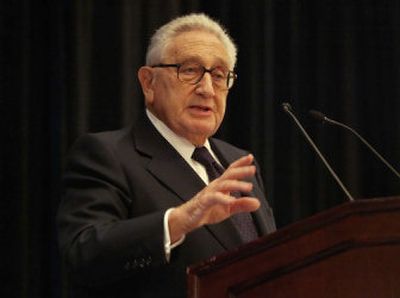Kissinger saw Hanoi regime as acceptable

WASHINGTON – Henry Kissinger quietly acknowledged to China in 1972 that Washington could accept a communist takeover of South Vietnam if that evolved after a withdrawal of U.S. troops – even as the war to drive back the communists dragged on with mounting deaths.
President Nixon’s envoy told Chinese Premier Zhou Enlai, “If we can live with a communist government in China, we ought to be able to accept it in Indochina.”
Kissinger’s blunt remarks surfaced in a collection of papers from his years of diplomacy released Friday by George Washington University’s National Security Archive. The collection was gathered from documents available at the government’s National Archives and obtained through the research group’s declassification requests.
Kissinger’s comments appear to lend credence to the “decent interval” theory posed by some historians who say the United States was prepared to see communists take over Saigon as long as that happened long enough after a U.S. troop departure to save face.
But Kissinger cautioned in an interview Friday against reaching easy conclusions from his words of more than three decades ago. “One of my objectives had to be to get Chinese acquiescence in our policy,” he said.
“We succeeded in it, and then when we had achieved our goal, our domestic situation made it impossible to sustain it,” he said, explaining that he meant Watergate and its consequences.
The papers consist of about 2,100 memoranda of Kissinger’s secret conversations with senior officials abroad and at home from 1969 to 1977 while he served under presidents Richard Nixon and Gerald Ford as national security adviser, secretary of state or both. The collection contains more than 28,000 pages.
The meeting with Zhou took place in Beijing on June 22, 1972, during stepped-up U.S. bombing and the mining of harbors meant to stall a North Vietnam offensive that began in the spring. China, Vietnam’s ally, objected to the U.S. course but was engaged in a historic thaw of relations with Washington.
Kissinger told Zhou the United States respected its Hanoi enemy as a “permanent factor” and probably the “strongest entity” in the region. “And we have had no interest in destroying it or even defeating it,” he insisted.
He complained that Hanoi had made one demand in negotiations that he could never accept – that the U.S. force out the Saigon government.
“This isn’t because of any particular personal liking for any of the individuals concerned,” he said. “It is because a country cannot be asked to engage in major acts of betrayal as a basis of its foreign policy.”
However, Kissinger sketched out scenarios under which communists might come to power.
While America cannot make that happen, he said, “if, as a result of historical evolution it should happen over a period of time, if we can live with a communist government in China, we ought to be able to accept it in Indochina.”
Pressed by Zhou, Kissinger further acknowledged that a communist takeover by force might be tolerated if it happened long enough after a U.S. withdrawal.
He said that if civil war broke out a month after a peace deal led to U.S. withdrawal and an exchange of prisoners, Washington would probably consider that a trick and have to step back in.
“If the North Vietnamese, on the other hand, engage in serious negotiation with the South Vietnamese, and if after a longer period it starts again after we were all disengaged, my personal judgment is that it is much less likely that we will go back again, much less likely.”
The envoy saw the possibility of friendly relations with adversaries after a war that, by June 1972, had killed more than 45,000 Americans. “What has Hanoi done to us that would make it impossible to, say in 10 years, establish a new relationship?”
Almost 2,000 more Americans would be killed in action before the last U.S. combat death in January 1973, the month the Paris Peace Accords officially halted U.S. action, left North Vietnamese in the South and preserved the Saigon government until it fell in April 1975.